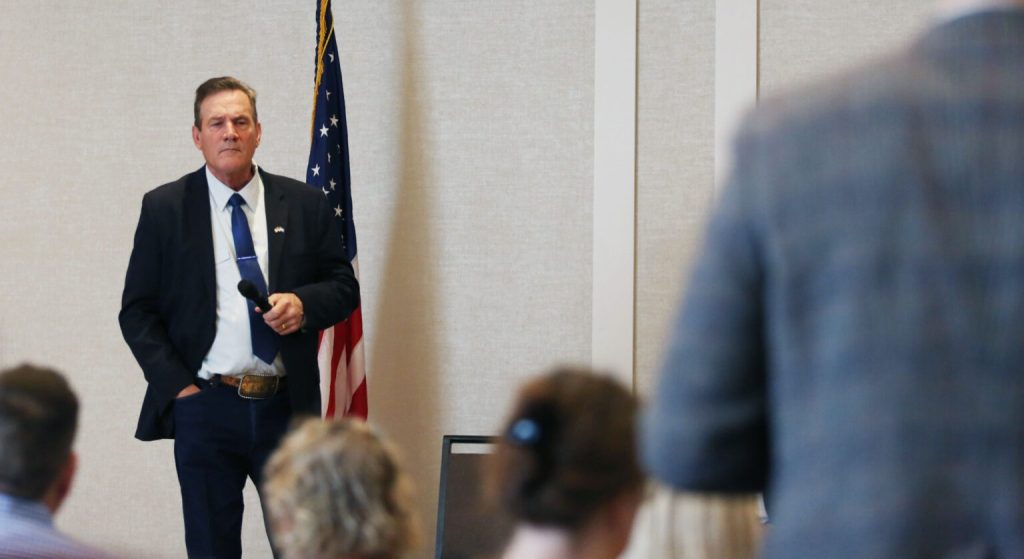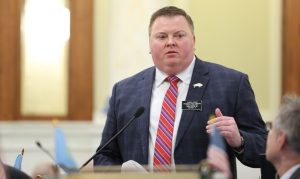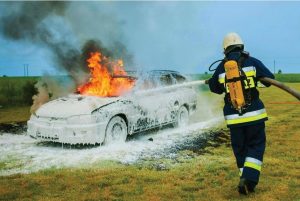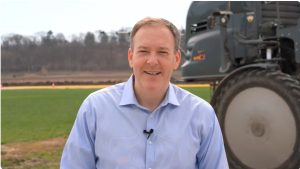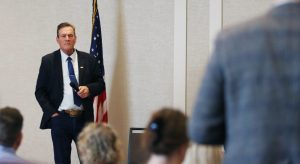
SIOUX FALLS — South Dakota Republican Gov. Larry Rhoden pushed back Thursday on a lawmaker’s suggestion that the agricultural industry should be more tightly regulated to improve water quality.
“Rest assured,” Rhoden told town hall attendees, “he’s going to be set straight on a few of his issues in a very kind, civil way. But I will have conversations.”
Senate President Pro Tempore Chris Karr, R-Sioux Falls, said during a legislative committee meeting Wednesday that it might be time to “get serious” about new regulations on agriculture to address the state’s polluted rivers and lakes.
“And that’s pretty scary for folks, especially for those that are in the community that starts with the letter ‘A’ and ends with ‘G,’” Karr said during the meeting. “We can sit here and talk about it, and dance around it all day. I think you can have some incentives, but we’re going to have to look at some restrictions as well, and regulate.”
Karr’s comments came after Legislative Research Council staff shared a report that over three-quarters of monitored river and stream miles in the state fail to fully support at least one of their intended uses — such as swimming, fishing or boating — with similar problems in many lakes.
Rhoden, a rancher, said during his Thursday town hall at the Canopy by Hilton hotel in Sioux Falls that Karr’s comments were “misinformation,” saying they were “made out of ignorance.” He added that “nobody on the planet has a bigger, more vested interest in protecting our environment and natural resources” than farmers and ranchers.
Rhoden told the media after the event that making a “carte blanche statement that we need more regulations is unhelpful, to say the least.”
In an interview later Thursday with South Dakota Searchlight, Karr said Rhoden reached out to him to talk about the comments. Karr said he hopes the discussion and the controversy around his comments will lead to a larger conversation surrounding South Dakota’s surface water quality.
He added that he “didn’t mean to pick on ag in particular,” but that the state will “have to look at restrictions and runoff” in rural and urban settings to improve surface water quality. The agricultural community has already risen up in defense, Karr said, as he predicted in his Wednesday comments.
“There’s been a pretty strong reaction,” Karr said, “but I’m hoping it’ll bring folks to the table to say that 75% failure in our rivers and streams is something we can’t live with.”
South Dakota has “proactive” programs in place to address water quality in the state, Rhoden said, including grants to reduce livestock waste runoff into waterways. Karr said he’s been speaking with water districts for years to learn about the state’s surface water quality problems, and he played a role in the $3 million infusion into a Big Sioux River grant program with 2021 legislation.
A recent final report on that program said it resulted in 67 buffer projects spanning 83 linear miles under 10-year contracts. The buffers prevent an estimated 1,500 pounds of phosphorus, 6,500 pounds of nitrogen and 1,000 tons of sediment from entering the Big Sioux River watershed each year.
Rep. Drew Peterson, R-Salem, a farmer, told South Dakota Searchlight that farmers and ranchers in his district are “highly regulated,” conservation-minded and “pay taxes to the watershed districts to improve water quality.”
“For someone to imply we are lax, unregulated and don’t care — that’s not fair to every producer and ag taxpayer working hard on this issue, and simply not true,” Peterson said.
Glenn Muller, executive director of the South Dakota Pork Producers Council, brought up the issue at the town hall, asking for Rhoden’s response.
Muller told South Dakota Searchlight that he would prefer the state further study the issue, to identify how different sectors of agriculture and other industries affect water quality. That would help create more targeted solutions, he said.
In response to Karr’s comments, Lt. Gov. Tony Venhuizen said that “top-down mandates” can be more expensive without being more effective.
“You can go too far the other way,” Venhuizen said, “and create a lot of new burdens that don’t really get you much in terms of value.”


